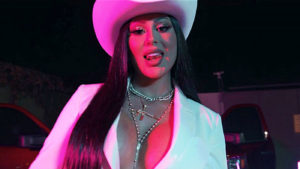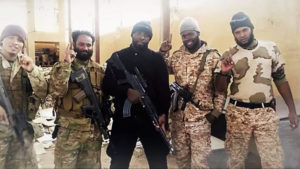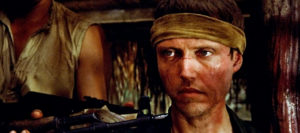It’s not easy being good. Living in a $42 million home, being worth $350 million, and stepping up to accept the greatest award of your career is no mean feat. Maybe, just maybe, we caught Will Smith at a bad time. Maybe, something else was weighing on his mind.
Put the price of fame aside, and the real pressure faced by the Fresh Prince, and to a lesser extent his “bitch slap” whipping boy Chris Rock, is being that most problematic of black male stereotypes: the role model.
Ironically, the pugnacious Smith’s rather comfortable living has come from playing an assortment of morally righteous heroes, including a homeless salesman, Muhammad Ali, and Venus and Serena Williams’s father. Arguably, as an actor, Smith is merely portraying characters who have little or no bearing on his real personality. By his own admission, his public persona is a confection, a construction “designed to protect myself, to hide myself from the world”. But under closer scrutiny, his self-indulgent tale doesn’t really stack up.
Smith has, for some years now, cried, crumbled and collapsed in countless interviews, reality TV scenarios and bizarre family encounters. He has spoken of his battles with mental health issues and his contemplation of suicide. He was left on the brink of a televised meltdown following his wife Jada Pinkett Smith’s revelation of an affair in 2015, aged 43, with a 22-year-old rapper. Pinkett’s adultery, which she described euphemistically as “an entanglement”, led to gossip about her and Smith agreeing to an open relationship (which to me sounds like cuckolding by another name).
Yet Smith has courted the role-model dollar for decades. Way back in 1993, he refused to kiss co-star Michael Anthony Hall in one of his breakthrough movies, Six Degrees of Separation, for fear of the scene alienating his fanbase. His carefully chosen and generally wholesome roles, as well as occasional musings about running for president one day, have ensured the sort of “four-quadrant” appeal that has made him Hollywood gold. But his emotional outbursts, which include a previous slapping incident involving a reporter in 2012, not only illustrate Smith’s edginess, they demonstrate the fragility of the black role model.
If you’re a working-class black kid from South Central or South London, the chances are you’re still battling with disproportionate levels of unemployment, mental health, and urban deprivation in your neighbourhood. In an ideal world, it’s these areas that can really benefit from role models on the ground. But in the absence of government or corporate behemoths investing heavily in disenfranchised black youths — perhaps by building a well-funded, sustainable, nationwide role-modelling programme — the whole idea is just that: an idea.
Practicalities aside, role modelling is fraught with philosophical and ideological difficulties. Many of those who champion them set unrealistic examples for young people to emulate, despite probably knowing hardworking black men and women in their area who could mentor a kid desperately in need of basic life skills.
While there have been predictable calls for the Academy to strip Smith of his Best Actor award, it is striking he didn’t wake up yesterday and face multiple cancellations by studios, corporate sponsors and the global media. “Successful” black men are something of a fetish, not just within the mainstream black diaspora, but also for white liberals and buccaneering reactionaries alike.
The diaspora likes straight up and down, messianic or redemptive figures. For many, complexity is in the journey, not in the flaky mind of those who break down and sob on camera because, you know, like, success is like, hard, man. For real.
White constituencies, on the other hand, who are in search of a strong black man, see a successful brotha as being either proof of what can be, or evidence of what is. Here, complexity is all in the mind: it’s either about idealism, dreaming and, in reality, exceptionalism. Who needs rich parents, connections, a private education or any of that luck stuff that comes as an accident of birth? Just pull your socks up and the rest will follow!
As uncomfortable as white observers may be about viewing the melee in LA through a racial lens, for black people, role modelling is always about racial dynamics, be they existential or more abstract. The “community” is all too aware that Smith’s violent outburst and the uncomfortable close-up of him yelling at Rock to “keep my wife’s name out of your fucking mouth” will have triggered a wider sense of vulnerability in the diaspora. If Smith can meltdown like this, it can happen to anyone. Well, newsflash, is does happen to anyone. All the time. Which is why it’s time to forget about Will Smith and Jada Pinkett representing anything other than their own self-indulgent, decadent, narcissistic selves.
Certainly, some within the community will look at Smith making an ass of himself and feel a sense of shame and embarrassment. Not only have we “lost” a role model, they will reason, he will have played into the hands of detractors who suggest that white audiences can tolerate black entertainers just as long as they focus on being entertaining and don’t trigger the white mainstream’s latent fear of the “big black man” or “crazy black woman”.
When I look around, I don’t see white kids being force fed the idea of role models. Many will counter that white youths don’t need obvious role modelling because mainstream society is already awash with white role models. But I think we’ve reached a point where role models have become confused and conflated with heroes and mentors — both of which offer more tangible meaning to young black people.
The distance and otherness of heroic figures, for one thing, allows for fantasising and stimulating the imagination, something I feel black kids are not encouraged to do enough as they are often consumed by in the moment “reality”. Mentors, on the other hand, are very much about taking the here and now by the scruff of the neck and showing young people how to navigate the world with practical ideas, strategies and tactics, to survive and thrive. Role models fall between these two stools. When the bar is set vertiginously high, too many black kids feel they can’t measure up to an Obama or a Stormzy or a Will Smith.
What they need are practical skills to deal with the day-to-day dramas that can help them through the labyrinth of school, family and their local postcode. And what they don’t need is another wannabe hero who can’t read the room.
Disclaimer
Some of the posts we share are controversial and we do not necessarily agree with them in the whole extend. Sometimes we agree with the content or part of it but we do not agree with the narration or language. Nevertheless we find them somehow interesting, valuable and/or informative or we share them, because we strongly believe in freedom of speech, free press and journalism. We strongly encourage you to have a critical approach to all the content, do your own research and analysis to build your own opinion.
We would be glad to have your feedback.
Source: UnHerd Read the original article here: https://unherd.com




